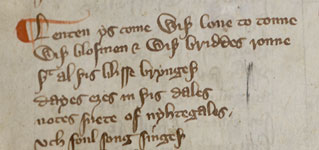|
|
|
|||||||
|
 This poem
takes up a common theme of medieval love-poetry, the contrast between the coming of
spring, when all creatures choose their mates, and the lover's own frustrations. The
movement of thought can be paralleled more concisely in the lover's complaint in John
Gower's late-C14 Confessio Amantis ('The Lover's Confession'): This poem
takes up a common theme of medieval love-poetry, the contrast between the coming of
spring, when all creatures choose their mates, and the lover's own frustrations. The
movement of thought can be paralleled more concisely in the lover's complaint in John
Gower's late-C14 Confessio Amantis ('The Lover's Confession'):
'Ferst to Nature if that I me compleigne, There are some close verbal parallels, mainly with the first stanza, in the spring opening of the EME debate-poem, The Thrush and the Nightingale, first recorded in Oxford, Bodleian Library, MS Digby 86, which probably dates from the late thirteenth century.
|
|||||||
|
|
|
|||||||
| Set up by Bella Millett, enm@soton.ac.uk. Last updated 28 July 2003 . Reproduction of British Library, Harley MS 2253, f. 71v, by permission of the British Library; no further reproduction permitted. |